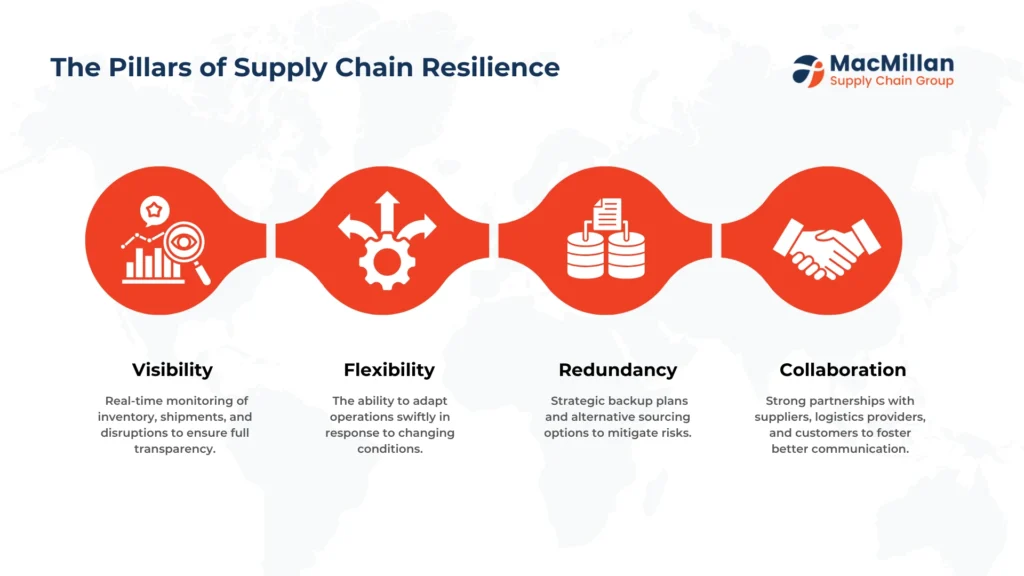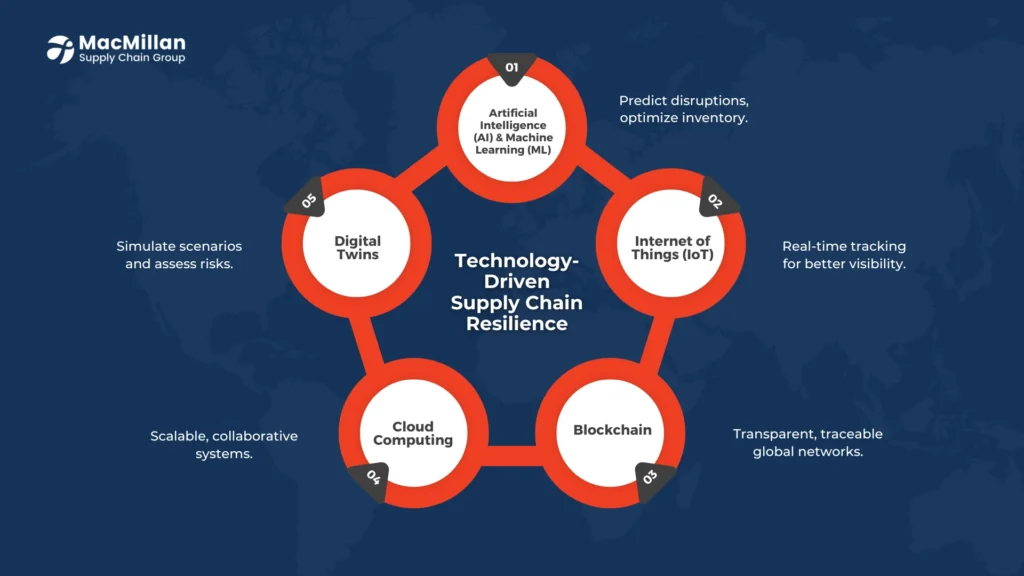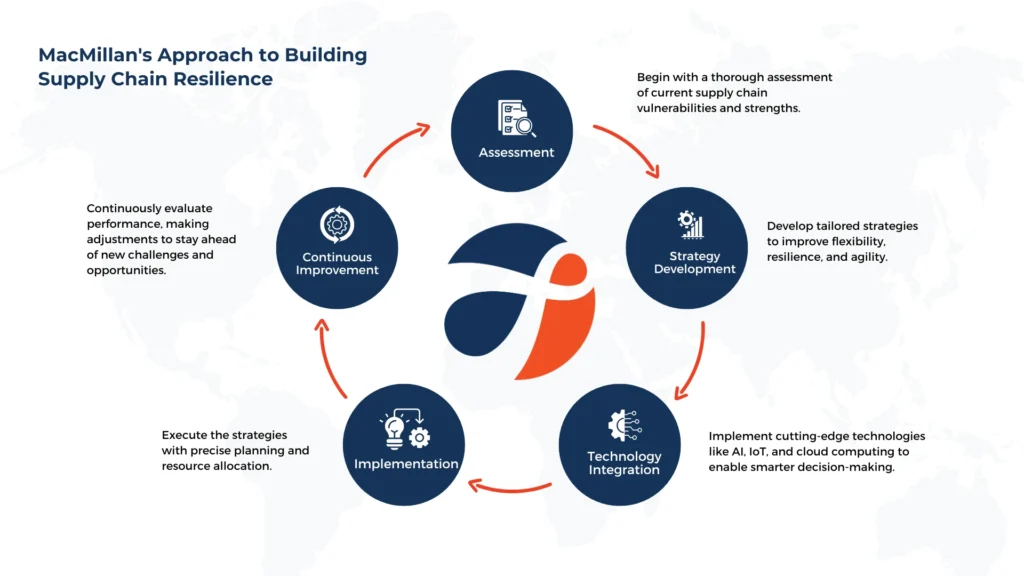A Quick Summary and Overview
In 2024, supply chain resilience is more critical than ever for businesses navigating global uncertainties. This comprehensive guide explores strategies to build a robust and adaptable supply chain, from leveraging advanced technologies to implementing risk mitigation techniques. We’ll delve into the importance of visibility, flexibility, and collaboration in creating a resilient supply network. By partnering with experts like MacMillan Supply Chain Group, companies can overcome common challenges and transform their supply chains into strategic assets. Discover how to future-proof your operations and gain a competitive edge in today’s dynamic business landscape.
An Introduction
The global business landscape is constantly evolving, presenting new challenges and opportunities for supply chain management. In 2024, building a resilient supply chain is no longer a luxury—it’s a necessity for survival and growth. Recent events, from the COVID-19 pandemic to geopolitical tensions, have highlighted the vulnerabilities in traditional supply chain models and the urgent need for more robust, flexible systems.
This article will guide you through the key strategies and best practices for enhancing supply chain resilience. We’ll explore how cutting-edge technologies, data-driven decision-making, and strategic partnerships can help your business weather disruptions and emerge stronger. Whether you’re a small enterprise or a multinational corporation, the insights shared here will empower you to transform your supply chain into a source of competitive advantage. Let’s dive into the world of supply chain resilience and discover how MacMillan Supply Chain Group can be your partner in this crucial journey.

Understanding Supply Chain Resilience
Supply chain resilience refers to a network’s ability to anticipate, adapt to, and recover from disruptions quickly and efficiently. In 2024, this concept goes beyond mere risk management—it’s about creating a supply chain that can thrive in uncertainty.
Key components of supply chain resilience include:
- Visibility: Real-time monitoring of inventory, shipments, and potential disruptions.
- Flexibility: The ability to quickly adjust operations in response to changing conditions.
- Redundancy: Strategic backup plans and alternative sourcing options.
- Collaboration: Strong partnerships with suppliers, logistics providers, and customers.
Building resilience requires a holistic approach that considers all aspects of your supply chain. This means assessing vulnerabilities, implementing robust risk management strategies, and fostering a culture of continuous improvement.
The benefits of a resilient supply chain are manifold:
– Minimized downtime during disruptions
– Improved customer satisfaction through consistent service
– Enhanced competitiveness in volatile markets
– Reduced long-term costs associated with disruptions
By prioritizing resilience, you’re not just protecting your business—you’re positioning it for sustainable growth. In the following sections, we’ll explore specific strategies to achieve this crucial goal.

Leveraging Technology for Supply Chain Resilience
In 2024, technology plays a pivotal role in building resilient supply chains. Advanced solutions offer unprecedented visibility, predictive capabilities, and automation that can transform your operations.
Key technologies enhancing supply chain resilience include:
- Artificial Intelligence (AI) and Machine Learning (ML): These technologies enable predictive analytics, helping you anticipate disruptions and optimize inventory levels.
- Internet of Things (IoT): IoT devices provide real-time tracking and monitoring of goods, enhancing visibility across the supply chain.
- Blockchain: This technology ensures transparency and traceability, crucial for managing complex, global supply networks.
- Cloud Computing: Cloud-based systems offer scalability and accessibility, allowing for seamless collaboration and data sharing among stakeholders.
- Digital Twins: Virtual replicas of your supply chain enable scenario planning and risk assessment.
Implementing these technologies requires careful planning and often, expert guidance. MacMillan Supply Chain Group specializes in integrating cutting-edge solutions tailored to your specific needs. Our team can help you:
– Assess your current technological capabilities
– Identify the most impactful solutions for your business
– Implement and optimize new technologies
– Train your team to leverage these tools effectively
By harnessing the power of technology, you can create a more agile, responsive, and resilient supply chain ready to face the challenges of 2024 and beyond.
Building Flexibility and Agility into Your Supply Chain
Flexibility and agility are cornerstones of supply chain resilience in 2024. These qualities enable your organization to respond swiftly to disruptions and capitalize on new opportunities.
Strategies to enhance flexibility and agility include:
- Diversifying Your Supplier Base: Reduce dependency on single sources by cultivating relationships with multiple suppliers across different geographic regions.
- Implementing Modular Supply Chain Design: Create interchangeable components in your supply chain that can be easily reconfigured as needed.
- Adopting Just-in-Case Inventory Management: Balance lean practices with strategic buffer stock to cushion against disruptions.
- Developing Multi-Modal Transportation Options: Ensure you have alternative shipping methods available to maintain product flow during disruptions.
- Fostering a Culture of Adaptability: Train your team to be responsive and innovative in the face of challenges.
MacMillan Supply Chain Group can help you implement these strategies by:
– Conducting a comprehensive analysis of your current supply chain structure
– Identifying areas for increased flexibility
– Developing customized plans for supplier diversification and inventory optimization
– Implementing agile processes and training programs
By building flexibility and agility into your supply chain, you’ll be better equipped to navigate the uncertainties of the global market, maintain customer satisfaction, and stay ahead of the competition.

Collaborative Partnerships for Enhanced Resilience
In 2024, no business is an island. Collaborative partnerships are essential for building truly resilient supply chains. By fostering strong relationships with suppliers, logistics providers, and even competitors, you can create a network that’s greater than the sum of its parts.
Key aspects of collaborative partnerships include:
- Information Sharing: Open communication channels to share forecasts, inventory levels, and potential disruptions.
- Joint Risk Management: Work together to identify and mitigate risks that affect the entire supply chain.
- Mutual Capacity Planning: Align production and logistics capacities to ensure smooth operations.
- Collaborative Innovation: Pool resources and knowledge to develop new solutions and technologies.
- Shared Performance Metrics: Establish common KPIs to drive collective improvement.
MacMillan Supply Chain Group excels in facilitating these collaborative relationships. We can help you:
– Identify potential partners that align with your business goals
– Establish effective communication protocols
– Develop shared risk management strategies
– Implement collaborative planning and forecasting systems
By leveraging our extensive network and expertise, you can build a web of partnerships that enhances your supply chain’s resilience. These collaborations not only help mitigate risks but also open up new opportunities for growth and innovation in the dynamic landscape of 2024.
Common Problems with Supply Chain Resilience
Our Solutions
Despite best efforts, many businesses struggle to achieve true supply chain resilience. Common problems include:
- Lack of End-to-End Visibility: Many companies struggle to gain a comprehensive view of their entire supply chain, leading to blind spots and inefficiencies.
- Inflexible Systems and Processes: Rigid, legacy systems often hinder quick adaptation to changing circumstances.
- Insufficient Risk Assessment: Many organizations fail to adequately identify and prepare for potential disruptions.
- Siloed Operations: Lack of integration between different departments and external partners can lead to communication breakdowns and inefficiencies.
- Over-Reliance on Single Sources: Dependency on a single supplier or region can leave businesses vulnerable to disruptions.
- Inadequate Technology Integration: Failure to leverage advanced technologies can result in missed opportunities for optimization and risk mitigation.
- Skill Gaps: Many organizations lack the in-house expertise to implement and manage complex resilience strategies.
At MacMillan Supply Chain Group, we’ve developed comprehensive solutions to address these challenges:
- Advanced Visibility Solutions: We implement state-of-the-art tracking and monitoring systems that provide real-time insights across your entire supply chain. Our dashboards offer a single source of truth, enabling informed decision-making.
- Flexible System Design: Our team designs and implements agile systems that can quickly adapt to changing conditions. We focus on modular architectures that allow for easy reconfiguration and scaling.
- Comprehensive Risk Assessment and Mitigation: We conduct thorough risk analyses, considering both internal and external factors. Our experts develop tailored strategies to mitigate identified risks and create robust contingency plans.
- Integrated Operations: We break down silos by implementing collaborative platforms and processes that foster seamless communication and coordination across your organization and with external partners.
- Supplier Diversification Strategies: Our team helps you build a diverse and resilient supplier network, balancing cost-effectiveness with risk mitigation.
- Cutting-Edge Technology Integration: We stay at the forefront of supply chain technology. Our solutions leverage AI, IoT, blockchain, and cloud computing to optimize your operations and enhance resilience.
- Expert Training and Support: We don’t just implement solutions—we ensure your team has the skills and knowledge to leverage them effectively. Our comprehensive training programs and ongoing support ensure you can maximize the benefits of your resilience strategies.
By partnering with MacMillan Supply Chain Group, you gain access to a team of experts dedicated to transforming your supply chain into a resilient, adaptable, and efficient network ready to face the challenges of 2024 and beyond.
How Can Readers Avoid Problems or Implement Solutions
To avoid common pitfalls and successfully implement resilience strategies, consider the following steps:
- Conduct a thorough assessment of your current supply chain, identifying vulnerabilities and areas for improvement.
- Develop a clear roadmap for enhancing resilience, with specific goals and timelines.
- Invest in the right technologies and partnerships that align with your resilience objectives.
- Foster a culture of continuous improvement and adaptability within your organization.
- Regularly review and update your resilience strategies to stay ahead of emerging risks and opportunities.
However, navigating the complex world of supply chain resilience can be challenging. That’s where MacMillan Supply Chain Group comes in. Our team of experts can guide you through every step of the process, from initial assessment to full implementation and ongoing optimization.
Don’t let supply chain vulnerabilities hold your business back. Take the first step towards a more resilient future today. Contact MacMillan Supply Chain Group for a free consultation. Our experts will work with you to develop a customized resilience strategy that addresses your unique challenges and goals.
Call us at 416-941-2759 or visit our website to schedule your consultation. Let’s build a resilient supply chain that will drive your success in 2024 and beyond. Your competitive edge is just a conversation away!
FAQs
Supply chain resilience refers to a network's ability to anticipate, withstand, and quickly recover from disruptions. It involves creating flexible, adaptable systems that can maintain operations and meet customer needs even in the face of unexpected challenges. MacMillan Supply Chain Group can help you assess your current resilience and develop strategies to enhance it.
Technology plays a crucial role in enhancing resilience by providing real-time visibility, enabling predictive analytics, and automating processes. Tools like AI, IoT, and blockchain can help you anticipate disruptions, optimize inventory levels, and quickly adapt to changing conditions. Our team at MacMillan can help you identify and implement the most effective technologies for your specific needs.
Key components include visibility, flexibility, redundancy, and collaboration. A resilient supply chain should have real-time monitoring capabilities, the ability to quickly adjust operations, strategic backup plans, and strong partnerships across the network. MacMillan Supply Chain Group can help you develop and integrate these components into your supply chain strategy.
Measuring resilience involves assessing factors like recovery time from disruptions, inventory turnover rates, supplier diversification, and the ability to meet customer demands during crises. MacMillan can help you develop a customized set of metrics and implement monitoring systems to track your supply chain's resilience over time.
Investing in resilience can lead to reduced downtime during disruptions, improved customer satisfaction, enhanced competitiveness, and lower long-term costs associated with supply chain failures. Our team can help you quantify these benefits and build a strong business case for resilience investments.
The timeline for building resilience varies depending on the complexity of your supply chain and your starting point. However, with the right partner, you can start seeing improvements in a matter of months. MacMillan Supply Chain Group offers phased implementation plans that deliver quick wins while working towards long-term resilience goals.
Absolutely! In fact, resilience can be even more critical for small businesses with limited resources to weather disruptions. MacMillan offers scalable solutions tailored to businesses of all sizes, ensuring that even small enterprises can build robust, resilient supply chains.
At MacMillan, we're committed to continuous learning and innovation. Our team regularly participates in industry conferences, collaborates with academic institutions, and conducts original research to stay at the forefront of supply chain resilience. This ensures that our clients always have access to the most current and effective strategies.
